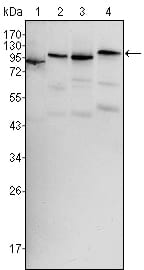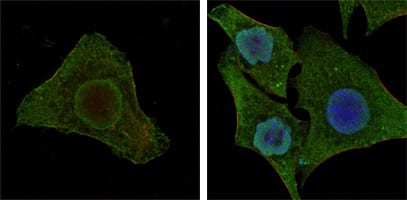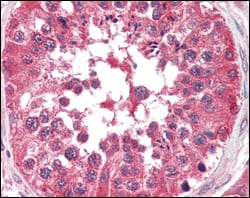


| WB | 1/500 - 1/2000 | Human,Mouse,Rat |
| IF | 咨询技术 | Human,Mouse,Rat |
| IHC | 1/200 - 1/1000 | Human,Mouse,Rat |
| ICC | 1/200 - 1/1000 | Human,Mouse,Rat |
| FCM | 咨询技术 | Human,Mouse,Rat |
| Elisa | 1/10000 | Human,Mouse,Rat |
| Aliases | BRAF1; RAFB1; B-RAF1; FLJ95109 |
| Entrez GeneID | 673 |
| clone | 1H12 |
| WB Predicted band size | 87kDa |
| Host/Isotype | Mouse IgG1 |
| Antibody Type | Primary antibody |
| Storage | Store at 4°C short term. Aliquot and store at -20°C long term. Avoid freeze/thaw cycles. |
| Species Reactivity | Human,Mouse |
| Immunogen | Purified recombinant fragment of human BRAF expressed in E. Coli. |
| Formulation | Purified antibody in PBS with 0.05% sodium azide. |
+ +
以下是3篇与BRAF抗体相关的文献及其摘要概括:
---
1. **文献名称**:*Mutations of the BRAF gene in human cancer*
**作者**:Davies, H., et al. (2002)
**摘要**:该研究首次报道BRAF基因在多种癌症(如黑色素瘤、结直肠癌)中的高频突变,其中V600E突变最常见。研究利用抗体检测突变BRAF蛋白的异常激活,揭示了其在MAPK信号通路中的致癌机制。
---
2. **文献名称**:*Assessment of BRAF V600E mutation status by immunohistochemistry with a mutation-specific monoclonal antibody*
**作者**:Capper, D., et al. (2011)
**摘要**:开发了一种特异性识别BRAF V600E突变蛋白的单克隆抗体(VE1),并通过免疫组化(IHC)验证其在胶质瘤、黑色素瘤等肿瘤中的高敏感性和特异性,为临床提供低成本快速检测方案。
---
3. **文献名称**:*RAF inhibitor resistance is mediated by dimerization of aberrantly spliced BRAF(V600E)*
**作者**:Poulikakos, P.I., et al. (2011)
**摘要**:研究通过Western blot等抗体检测技术,发现BRAF抑制剂耐药性与异常剪接的BRAF V600E二聚体形成相关,为克服耐药性提供了新靶点。
---
4. **文献名称**:*Inhibition of mutated, activated BRAF in metastatic melanoma*
**作者**:Flaherty, K.T., et al. (2010)
**摘要**:针对BRAF V600E突变的抑制剂PLX4032的临床试验显示显著疗效。研究使用BRAF抗体检测患者肿瘤组织中突变蛋白水平,证实其作为治疗应答的生物标志物潜力。
---
以上文献涵盖了BRAF抗体的基础研究、检测方法开发、耐药机制及临床应用,可作为相关领域的关键参考。
BRAF antibodies are essential tools in cancer research and diagnostics, targeting the BRAF protein—a serine/threonine kinase encoded by the BRAF gene. This protein is a critical component of the MAPK/ERK signaling pathway, which regulates cell growth, proliferation, and survival. Mutations in BRAF, particularly the V600E substitution, result in constitutive activation of the kinase, driving uncontrolled cellular signaling and tumorigenesis. Such mutations are prevalent in cancers like melanoma, colorectal cancer, and papillary thyroid carcinoma.
BRAF-specific monoclonal antibodies are widely used in laboratory research to detect BRAF expression or mutant variants in tissue samples, often via immunohistochemistry (IHC) or Western blotting. Clinically, they serve as companion diagnostics to identify patients eligible for BRAF-targeted therapies, such as vemurafenib or dabrafenib. These inhibitors selectively block mutant BRAF activity, improving outcomes in BRAF-mutated cancers. However, resistance mechanisms and pathway reactivation necessitate ongoing research into combination therapies and next-generation inhibitors.
The development of BRAF antibodies has also advanced understanding of tumor biology, enabling stratification of patients based on molecular profiles. Their specificity and reliability make them indispensable for both translational research and precision oncology, underscoring their role in bridging laboratory discoveries with therapeutic applications.
×